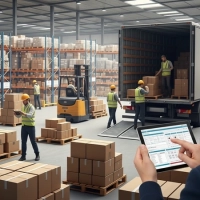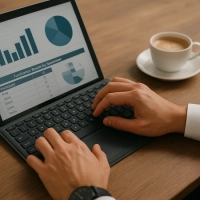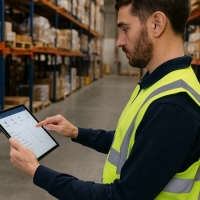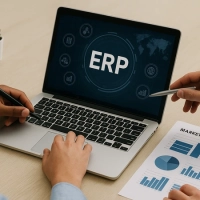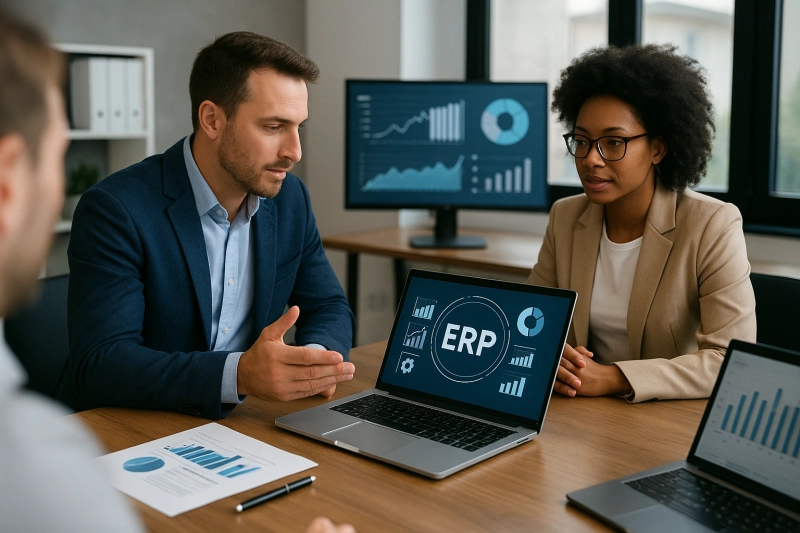
In today's business world , competition, speed and efficiency have become the most important factors for success.
It is no longer a choice, but a necessity, for companies to manage all processes, from production to accounting, from inventory management to customer relations, from a single center and in real time.
The most powerful technological solution that meets this need is ERP (Enterprise Resource Planning) software .
So what is ERP , what modules does it include, what advantages does it offer to businesses, and what should be considered when choosing the right ERP system?
You can find answers to all these questions in this comprehensive guide.
What is ERP? (Enterprise Resource Planning)
ERP is an abbreviation for Enterprise Resource Planning .
In short, they are systems that collect and manage all the basic business processes of a business under a single integrated software .
The main purpose of ERP systems;
- Finance and accounting ,
- Sales and customer relations ,
- Stock and supply chain ,
- Production planning and quality control ,
- Human resources and payroll ,
To ensure that each of the critical processes such as these operate in a single database with common and up-to-date information .
Every department has access to the same real-time data, allowing them to make faster, more accurate, and data-driven decisions.
Development of ERP Systems
The first ERP systems evolved from production-oriented MRP (Material Requirements Planning) software in the 1960s.
Finance and procurement modules were added with MRP II in the 1980s.
From the mid-1990s onwards, the concept of “ERP” was born and fully integrated solutions covering every process from accounting to HR became widespread.
Today, cloud-based ERP and artificial intelligence-supported ERP solutions provide businesses with greater flexibility by offering 24/7 access and advanced analytical features over the internet.
Basic Features of ERP
The most important factor that determines the success of an ERP system is its modular and flexible structure .
The main features are:
- Finance and Accounting Management: Collects all financial transactions such as invoice, current account, budget, cash flow and tax management in one place.
- Stock and Supply Chain Management: Warehouse tracking, inventory planning, order automation and supplier relations are managed in an integrated manner.
- Production and Operations Management: Production planning, material requirements analysis, work order tracking and quality control processes are optimized.
- Sales and CRM (Customer Relationship Management): Provides offer preparation, order management, post-sales support and marketing automation.
- Human Resources and Payroll: Organizes processes such as personnel information, payroll, leave, and performance evaluation.
- Reporting and Analytics: Provides accurate and fast decision making with real-time data analysis.
- Ease of Integration: Can be connected with e-commerce sites, POS systems, accounting software and other business tools via API.
ERP Solutions and Usage Models
ERP systems can be used today with different installation and license models:
- Cloud-Based ERP: No server installation required. Access is available from anywhere with an internet connection. It's scalable and updates are automatic.
- On-Premise ERP: Installed on the company's own servers. Customization options are abundant, but initial setup and maintenance costs are high.
- Hybrid ERP: Offers mixed solutions that combine the advantages of cloud and local systems.
Cloud-based ERP solutions have become the most preferred model in recent years for SMEs and growth-oriented companies as they provide cost advantages and flexible use.
Advantages of Using ERP for Businesses
An ERP system doesn't just streamline daily operations;
It also creates long-term growth, cost optimization and competitive advantage.
1. Increased Efficiency and Productivity
Manual processes and repetitive data entry are eliminated.
The flow of information between departments is automated and the workforce can be directed to more strategic tasks.
2. Cost Control and Savings
With ERP, unnecessary stock accumulation and production errors are minimized.
Preventing waste of time and resources provides a direct cost advantage .
3. Correct and Fast Decision Making
Thanks to real-time reporting and analytical tools, managers can make instant and accurate decisions.
4. Increase in Customer Satisfaction
Being able to track every step from order to delivery increases customer satisfaction and strengthens loyalty.
5. Legal Compliance and Security
Centralized management of data facilitates auditing, backup, and compliance with legal regulations.
Cloud ERP solutions minimize risks with advanced cyber security and data encryption technologies.
Criteria to Consider When Choosing an ERP
Choosing the right ERP software is critical to a successful digital transformation.
Companies should consider the following points in the decision process:
- Needs Analysis: Current business processes and growth plans should be determined.
- Modular Flexibility: New modules should be easily added as the business grows.
- User-Friendly Interface: A simple and mobile-friendly design that employees can quickly adapt to should be selected.
- Integration Ability: It should be able to connect seamlessly with systems such as e-commerce, CRM, POS, accounting.
- Technical Support and Updates: 24/7 support and regular security/update services should be provided.
- Cost and ROI Calculation: All expenses such as license, maintenance and training should be analyzed in advance.
Conclusion
ERP software is a strategic management tool that enables businesses to use their resources efficiently, reduce their costs and speed up their decision-making processes.
For businesses of all sizes, from manufacturing to retail, from SMEs to multinational corporations , cloud-based ERP solutions are no longer a luxury but a fundamental requirement for competitive survival .











